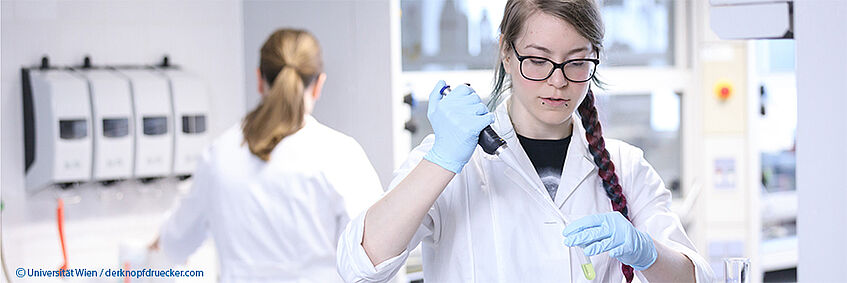Master Programme Food Chemistry

Key facts
type of study
fulltime
required language certificate
english level C1
language of instruction
german and english
main location
1090 Währingerstraße 38-42
regular study time
4 semester (fulltime)
credits
120 ECTS
start of studies
recommended in the winter semester,
possible also in the summer semester
for further information please follow this link:
Tasks and challenges of future food chemists
Food is not food. Nowadays, consumers ask more and more questions about the nutritional and health value, the authenticity and origin and last, but not least, about the safety of the food they eat. The Master Programme Food Chemistry provides the basis to answer those questions and to fulfil the increasing demand for healthy and safe food in our society.
Food Chemistry deals with the ingredients of food on a molecular scale. It plays a key role in dealing with present and future food crises. Within the field of food sciences, the analytical expertise of the food chemist is unique. The molecular understanding makes it possible for the food chemist to understand and assess chemical interrelations important for the production of foods and to understand the effects of new technologies on the molecular compounds of food.
Intentions of the Master Programme Food Chemistry
During the Master Programme "Food Chemistry", besides gaining the factual knowledge, the students acquire practical skills required in a laboratory and in conducting studies. Furthermore, skills how to get information and how to assess and interpret them are acquired.
The graduates of the Master's programme in Food Chemistry at the University of Vienna are able to independently study food, consumer goods and cosmetics with regard to their ingredients and possible contaminants scientifically, legally and toxicologically. In addition, students are able to deal with analytical questions on their own responsibility and to plan and carry out analyses of plant and animal foods, as well as any impurities they may contain. Besides teaching the theoretical basics of food chemistry, food law, physiology and toxicology as well as analytical chemistry, the practical laboratory work are in the foreground of the Master Programme Food Chemistry. The students learn how to deal with the material to be analysed as well as the use of modern analysis methods and equipment. The master thesis offers students the opportunity to write their own scientific papers on food chemistry, food analysis, food toxicology and physiology.
The Master Programme Food Chemistry consists of 120 ECTS, which is equivalent to a duration of 4 semesters full time study. Please follow the links to the curriculum, and the courses of the Master Programme Food Chemistry.
Demand for food chemists at the job market
The graduates of the Master's programme in Food Chemistry have profound knowledge in the field of food research and food safety. The training covers factual knowledge, as well as research and practical skills and the work fields of our graduates are diverse:
They work for public authorities or consumer organisations, as well as in the private sector for commercial laboratories or in the nutrition industry. Private and state research institutions and pharmaceutical companies are an option for Food Chemistry graduates, too.
Their tasks include the supervision and assessment of production processes and products, quality control and toxicological assessments. They compile expert reports and conduct surveys, advise producers or develop new analytical methods or innovative products. The graduates can also pursue a scientific career continuing with a PhD and postdoctoral studies.
